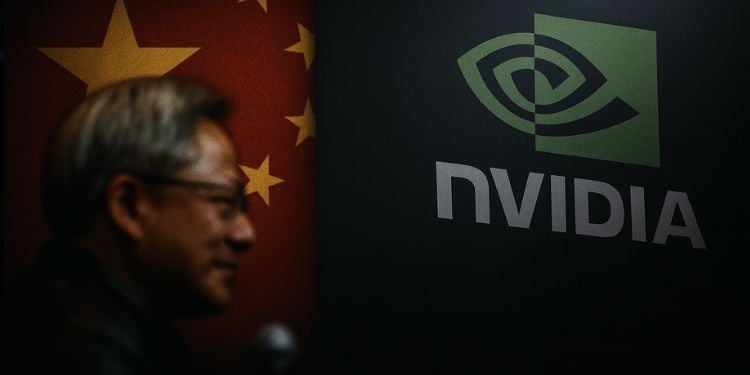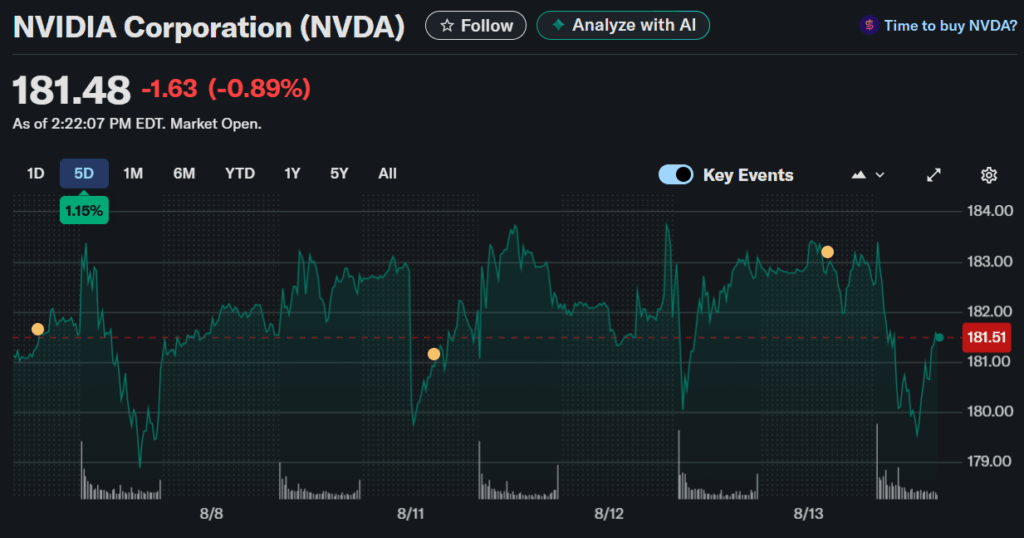Beijing Turns Up the Heat: China Pressures Tech Giants to Abandon Nvidia H20 Chips in High-Stakes Tech Power Play

- China is pressuring major tech firms like Tencent, ByteDance, and Baidu to replace Nvidia’s H20 chips with domestic alternatives over national security concerns.
- Regulators warn of potential data exposure and backdoors, framing the shift as part of a long-term strategy for technological independence.
- While local chips trail in performance, state-backed momentum is accelerating the move away from foreign semiconductors, threatening Nvidia’s position in China.
There’s a quiet but deliberate move playing out in China’s tech sector — and it’s not about flashy product launches or record-breaking IPOs. This is bigger. It’s about the silicon at the heart of the country’s AI ambitions. Beijing has begun pressing its largest technology firms — Tencent, ByteDance, Baidu — to step away from Nvidia’s H20 chips and pivot toward homegrown processors. The message isn’t wrapped in sanctions or bans, but the undertone is unmistakable: the future of China’s AI infrastructure will not be built on foreign hardware.

The Security Question Beijing Won’t Ignore
Officials aren’t simply making a case for “buying local” — they’re sounding alarms about security and sovereignty. Procurement processes often require sharing technical and operational details with U.S. authorities, a move Chinese regulators say could expose sensitive data. On top of that, whispers about possible backdoors in foreign chips have only deepened the mistrust. In a geopolitical climate already strained by export controls and trade restrictions, Beijing’s caution feels less like overreaction and more like calculated self-defense.
Domestic Chips Over Performance Perfection
China’s local chipmakers aren’t yet matching Nvidia’s H20 in raw processing power, but performance isn’t the priority here — resilience is. Regulators are making it clear that short-term trade-offs are worth the long-term payoff of independence. Some companies have already started scaling back H20 orders, while others hesitate due to workload compatibility. But with state-owned enterprises reassessing procurement policies and the government framing self-reliance as a strategic necessity, the momentum is shifting fast.
The Stakes for Nvidia and the Global AI Race
For Nvidia, the H20 represents one of its last viable products in China under U.S. export restrictions — a less advanced model, but still critical for AI development in the region. If Chinese firms accelerate their switch to domestic processors, Nvidia’s position in one of the world’s largest AI markets could erode rapidly. For Beijing, however, this isn’t just a market adjustment; it’s a long game to ensure the country’s digital future runs on technology it controls entirely. And for the rest of the world, it’s a reminder that in the race for AI dominance, chips aren’t just components — they’re strategic weapons.
The post Beijing Turns Up the Heat: China Pressures Tech Giants to Abandon Nvidia H20 Chips in High-Stakes Tech Power Play first appeared on BlockNews.
Beijing Turns Up the Heat: China Pressures Tech Giants to Abandon Nvidia H20 Chips in High-Stakes Tech Power Play

- China is pressuring major tech firms like Tencent, ByteDance, and Baidu to replace Nvidia’s H20 chips with domestic alternatives over national security concerns.
- Regulators warn of potential data exposure and backdoors, framing the shift as part of a long-term strategy for technological independence.
- While local chips trail in performance, state-backed momentum is accelerating the move away from foreign semiconductors, threatening Nvidia’s position in China.
There’s a quiet but deliberate move playing out in China’s tech sector — and it’s not about flashy product launches or record-breaking IPOs. This is bigger. It’s about the silicon at the heart of the country’s AI ambitions. Beijing has begun pressing its largest technology firms — Tencent, ByteDance, Baidu — to step away from Nvidia’s H20 chips and pivot toward homegrown processors. The message isn’t wrapped in sanctions or bans, but the undertone is unmistakable: the future of China’s AI infrastructure will not be built on foreign hardware.

The Security Question Beijing Won’t Ignore
Officials aren’t simply making a case for “buying local” — they’re sounding alarms about security and sovereignty. Procurement processes often require sharing technical and operational details with U.S. authorities, a move Chinese regulators say could expose sensitive data. On top of that, whispers about possible backdoors in foreign chips have only deepened the mistrust. In a geopolitical climate already strained by export controls and trade restrictions, Beijing’s caution feels less like overreaction and more like calculated self-defense.
Domestic Chips Over Performance Perfection
China’s local chipmakers aren’t yet matching Nvidia’s H20 in raw processing power, but performance isn’t the priority here — resilience is. Regulators are making it clear that short-term trade-offs are worth the long-term payoff of independence. Some companies have already started scaling back H20 orders, while others hesitate due to workload compatibility. But with state-owned enterprises reassessing procurement policies and the government framing self-reliance as a strategic necessity, the momentum is shifting fast.
The Stakes for Nvidia and the Global AI Race
For Nvidia, the H20 represents one of its last viable products in China under U.S. export restrictions — a less advanced model, but still critical for AI development in the region. If Chinese firms accelerate their switch to domestic processors, Nvidia’s position in one of the world’s largest AI markets could erode rapidly. For Beijing, however, this isn’t just a market adjustment; it’s a long game to ensure the country’s digital future runs on technology it controls entirely. And for the rest of the world, it’s a reminder that in the race for AI dominance, chips aren’t just components — they’re strategic weapons.
The post Beijing Turns Up the Heat: China Pressures Tech Giants to Abandon Nvidia H20 Chips in High-Stakes Tech Power Play first appeared on BlockNews.


